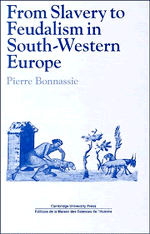Book contents
- Frontmatter
- Contents
- List of maps
- Foreword by T. N. Bisson
- Abbreviations
- 1 The survival and extinction of the slave system in the early medieval West (fourth to eleventh centuries)
- 2 Society and mentalities in Visigothic Spain
- 3 From the Rhône to Galicia: origins and modalities of the feudal order
- 4 Descriptions of fortresses in the Book of Miracles of Sainte-Foy of Conques
- 5 The formation of Catalan feudalism and its early expansion (to c. 1150)
- 6 Feudal conventions in eleventh-century Catalonia
- 7 The noble and the ignoble: a new nobility and a new servitude in Catalonia at the end of the eleventh century
- 8 Rural communities in Catalonia and Valencia (from the ninth to the mid-fourteenth centuries) (in collaboration with Pierre Guichard)
- 9 From one servitude to another: the peasantry of the Frankish kingdom at the time of Hugh Capet and Robert the Pious (987–1031)
- 10 Marc Bloch, historian of servitude: reflections on the concept of ‘servile class’
- Index
- Past and Present Publications
Foreword by T. N. Bisson
Published online by Cambridge University Press: 04 August 2010
- Frontmatter
- Contents
- List of maps
- Foreword by T. N. Bisson
- Abbreviations
- 1 The survival and extinction of the slave system in the early medieval West (fourth to eleventh centuries)
- 2 Society and mentalities in Visigothic Spain
- 3 From the Rhône to Galicia: origins and modalities of the feudal order
- 4 Descriptions of fortresses in the Book of Miracles of Sainte-Foy of Conques
- 5 The formation of Catalan feudalism and its early expansion (to c. 1150)
- 6 Feudal conventions in eleventh-century Catalonia
- 7 The noble and the ignoble: a new nobility and a new servitude in Catalonia at the end of the eleventh century
- 8 Rural communities in Catalonia and Valencia (from the ninth to the mid-fourteenth centuries) (in collaboration with Pierre Guichard)
- 9 From one servitude to another: the peasantry of the Frankish kingdom at the time of Hugh Capet and Robert the Pious (987–1031)
- 10 Marc Bloch, historian of servitude: reflections on the concept of ‘servile class’
- Index
- Past and Present Publications
Summary
The studies gathered in this volume are changing our ideas about medieval social history. With the lone exception of Georges Duby, no one since Marc Bloch has done so much as Pierre Bonnassie to clarify big questions relating to the persistence and transformation of pre-millennial societies in France. When and how did ancient slavery end? When and how did agrarian labour assume the diverse forms of subjection commonly (and vaguely) labelled ‘serfdom’ by historians? How were such changes related to economic growth, to the restructuring of social power, and to the cultures and initiatives of peasants? These were questions about the history of people in the mass and they evoked equally capacious theoretical issues concerning the nature and stages of pre-industrial societies.
Such matters were not neglected by previous historians, least of all by Bloch, but their researches had not led to secure results. Everyone complained about the documents, too few (it was said) and too elitist to illuminate the scorned and voiceless many. It hardly helped to read the proliferating regional monographs, which seemed on the matter of serfdom to stress peculiarities at the expense of wider uniformities (and whose conclusions have to this day defied cogent summation). To build theories of feudalism on historical work was to build houses of cards. Non-Marxist historians themselves were in disagreement over the chronology of vassalage and feudal tenures. Nevertheless, a methodological milestone had been passed.
- Type
- Chapter
- Information
- From Slavery to Feudalism in South-Western Europe , pp. ix - xiPublisher: Cambridge University PressPrint publication year: 1991

